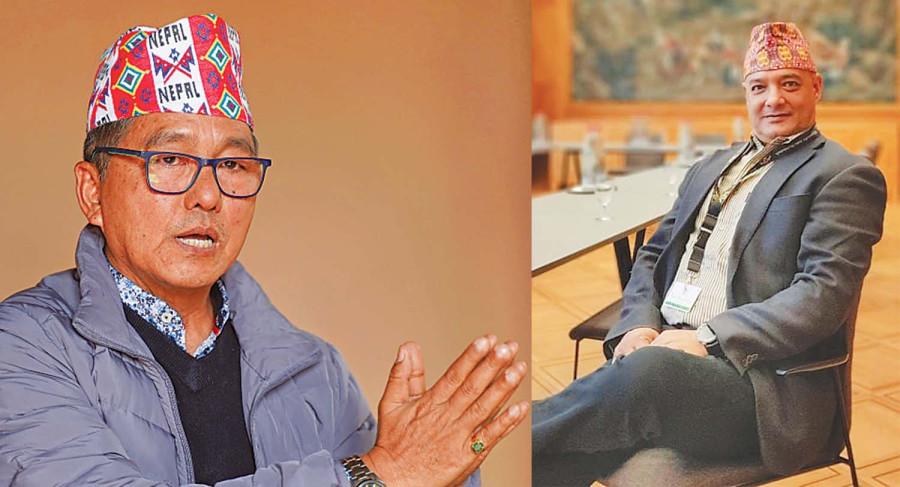National
Feud deepens in RPP amid leadership tussle
Lingden on July 9 appointed Roshan Karki to head Disciplinary Committee, removed Sagun Lawati as RPP spokesman.
Post Report
The Rastriya Prajatantra Party, which led a pro-monarchy movement two months ago, has become embroiled in internal conflict. A tug-of-war is unfolding between the establishment faction led by Chairman Rajendra Lingden and a rival group headed by senior leader Prakash Chandra Lohani, General Secretary Dhawal Shamsher Rana, and others. As both factions vie for dominance, they have begun devising strategies to undermine each other.
Tension escalated following Chairman Lingden’s decision on July 9 to appoint party vice-chair Roshan Karki to the party’s Disciplinary Committee and remove Spokesperson Sagun Sunder Lawati. The rival group has protested this decision.
On July 9, they gathered at General Secretary Rana’s residence to express their dissatisfaction. The group claims that Nawaraj Subedi’s removal as the chair of the Disciplinary Committee and Karki’s elevation to the position was Lingden’s “illegitimate” act. They have also lodged a formal complaint with the Election Commission.
However, the Lingden faction claims that since the position of the Disciplinary Committee had been vacant, the party chair appointed Karki to it. Subedi, who led the Joint People’s Movement to oversee the March 28 protest that claimed the lives of two people and damaged properties worth millions of rupees, had announced to relinquish his party position.
According to party leaders, Subedi verbally gave up the party position. However, the party statute only accepts a written resignation, which he had not submitted. This legally retains his claim to the chair of the Disciplinary Committee.
Leaders, including Lohani, Bikram Pandey, and Dhawal Shamsher Rana, presented Subedi as a face to challenge Lingden’s leadership, a leader close to Lingden said.
After Subedi and Lawati, RPP chair Lingden also took action against Mukunda Shyam Giri. Giri, the party vice-chair and a central committee member were dismissed from the party.
In response, like Subedi and Lawoti, Giri also accused Lingden of becoming increasingly autocratic in his leadership and petitioned the Election Commission against the decision.
“It is in my notice that the Election Commission, two days ago, with the timeframe of a week, asked the party for reasons for the action against us,” said Lawoti.
Rabindra Mishra, the senior vice-chair, has remained silent in this whole episode. A party leader close to him says that the party needs a mediator should the rift deepen, a role Mishra could assume.
Mishra is not out of the party, but is neutral, an aide said, suggesting that he could mediate should the party need his help.
When a party leader close to him claimed so, Mishra urged that his silence on the party's recent dispute should not be interpreted as fear. In a social media post with a warning, he appeared to target party chairman Lingden, stating that if anyone perceived his lack of response as an act of fear, the consequences could prove costly.
Even though it has been almost four years since RPP unification with the leaders of Bibeksheel Shaja, which Mishra earlier led, the Election Commission has yet to begin updating the names of 40 leaders from the Mishra faction.
Similarly, the tussle between Lingden and Rana is not new. In October last year, while Rana, the party's general secretary, was undergoing treatment at the Tata Memorial Hospital in Mumbai, India, Lingden removed him as the head of the organisational department and replaced him with senior leader Buddhiman Tamang.
Rana is probably taking revenge by backing the people Lingden has taken action against, an RPP leader said. “In this sense, both leaders have made mistakes.”
A senior leader, speaking anonymously, said if the party statute is to be abided by, the RPP should hold its general convention by December.
Lingden is expected to contest party chair for a second term, with Vice-chairman Bikram Pandey and General Secretary Rana as potential contenders. Pandey is the primary challenger, actively building his support base in the party.
But Lawoti argues that the contender for party chair from their side has yet to be decided.
“The general convention will be held on time. Unlike in the Nepali Congress, the general convention of our party can be deferred only by the central committee, not the party chair,” Lawoti said. “So there is no chance of the general convention being postponed.”
Whether Dhawal intends to run for the chair or support Pandey remains to be seen. Due to his relatively weak organisational hold, he is more likely to side with the anti-Lingden faction, which includes Pandey. Prakash Chandra Lohani also appears to be supporting Pandey. However, it is still unclear where Pashupati Shamsher Rana stands, despite his support to Lingden so far.
Lohani and Rana backed Lingden in the last general convention. Lohani became disillusioned after failing to secure a seat in Parliament, while Rana was reportedly angered after not being appointed a minister. When the party’s working committee placed Pashupati Shamsher at the top of the proportional representation list, putting Lohani lower in priority, it created a rift between Lohani and Lingden.
According to party insiders, Rana had hoped to become the minister for culture, tourism and civil aviation. However, Lingden appointed Bikram Pandey to the post at the last minute. Since then, Rana has consistently positioned himself as the opposition. Although Pandey benefited from Rana’s exclusion, he, too, has drifted away from Lingden.
During Pandey’s tenure as minister for urban development and Lingden’s as minister for energy, the latter cancelled a Rs2.5 billion irrigation contract allegedly arranged through Pandey’s connections. This incident is said to have enraged Pandey, who now prepares to challenge Lingden’s chairmanship.




 13.12°C Kathmandu
13.12°C Kathmandu













